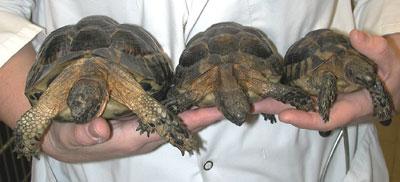Checking up on tortoises waking from hibernation
Free check ups are being offered for tortoises that have woken up from a long winter’s sleep.

Post hibernation clinics
The post hibernation clinics are being run this week (between March 23 and 27) at the Hospital for Small Animals, at Easter Bush, which is part of the Royal (Dick) School of Veterinary Studies.
Vets will check the tortoises to make sure that they have emerged from hibernation without problems.
Tortoises are especially vulnerable once they awake from hibernation because their white blood cell count is low, which means it is harder to fight infection.
They are also likely to be dehydrated and will need to flush away toxins that have accumulated in their kidneys during their winter sleep.
Early treatment is important
If there are any problems it is important that they are picked up early so that appropriate treatment can be given promptly.
Kevin Eatwell, a vet with the Hospital’s Exotic Animals and Wildlife Service, said: "If there are any problems it is important that they are picked up early so that appropriate treatment can be given promptly. This can make all the difference in helping tortoises to recover from hibernation as this is a time when they are particularly susceptible to illnesses."
Mr Eatwell, who is also a veterinary liaison officer to the British Chelonia Group, the oldest tortoise charity in the UK, will also give a talk on Post Hibernation Care on Friday, March 27 2008 at 6.15pm. Anyone wishing to book an appointment for a tortoise health check or to register for the talk should contact the Hosptial for Small Animals on 0131 650 7650.
For more information you can contact Tara Womersley, Press and PR officer, University of Edinburgh, on 0131 650 9836 or 07791 355 804.


